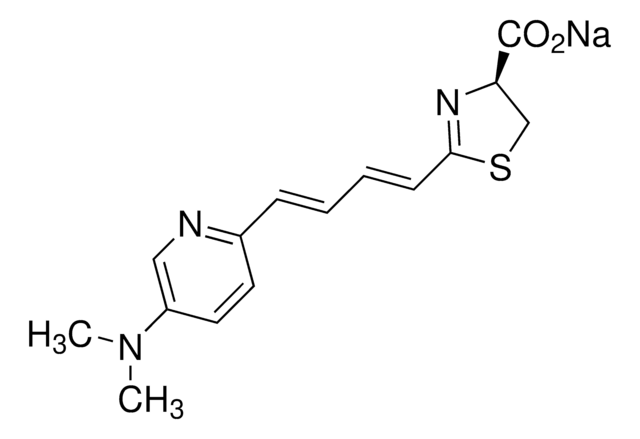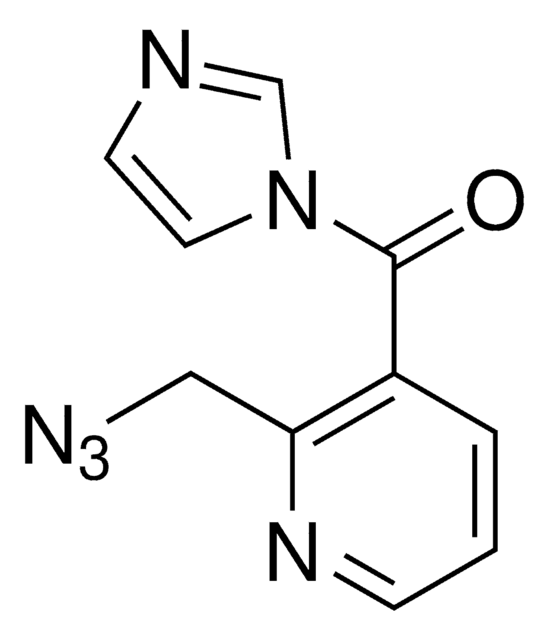908401
1-Methyl-7-nitroisatoic anhydride
Synonym(s):
1-Methyl-7-nitro-2H-3,1-benzoxazine-2,4(1H)-dione, 1-methyl-7-nitro-2H-3,1-Benzoxazine-2,4(1H)-dione, 1M7, RNA SHAPE probe, Reagent for RNA SHAPE-MaP
Sign Into View Organizational & Contract Pricing
All Photos(3)
About This Item
Empirical Formula (Hill Notation):
C9H6N2O5
CAS Number:
Molecular Weight:
222.15
MDL number:
UNSPSC Code:
12352119
NACRES:
NA.22
Recommended Products
form
powder
mp
204.5 °C
storage temp.
2-8°C
InChI
1S/C9H6N2O5/c1-10-7-4-5(11(14)15)2-3-6(7)8(12)16-9(10)13/h2-4H,1H3
InChI key
MULNCJWAVSDEKJ-UHFFFAOYSA-N
Application
1-Methyl-7-nitroisatoic anhydride (1M7) is used as an in vivo SHAPE-MaP reagent for live cell RNA structure analysis at single nucleotide resolution. SHAPE -- or selective 2′-hydroxyl acylation analyzed by primer extension -- uses small, electrophilic chemical probes such as 1M7 to react with the 2′-hydroxyl group and provides insight to RNA structure. When combined with mutational profiling (MaP), quantitative nucleotide measurements are possible for entire transciptomes. Together, these methods deepen the understanding of RNA interactions and regions that may be exploited for design of RNA-targeting small-molecule drugs.
Other Notes
Pervasive Regulatory Functions of mRNA Structure Revealed by High-Resolution SHAPE Probing
SnapShot: RNA Structure Probing Technologies
Detection of RNA-Protein Interactions in Living Cells with SHAPE
Standardization of RNA Chemical Mapping Experiments
In-cell RNA structure probing with SHAPE-MaP
A Fast-Acting Reagent for Accurate Analysis of RNA Secondary and Tertiary Structure by SHAPE Chemistry
SnapShot: RNA Structure Probing Technologies
Detection of RNA-Protein Interactions in Living Cells with SHAPE
Standardization of RNA Chemical Mapping Experiments
In-cell RNA structure probing with SHAPE-MaP
A Fast-Acting Reagent for Accurate Analysis of RNA Secondary and Tertiary Structure by SHAPE Chemistry
related product
Product No.
Description
Pricing
Storage Class Code
11 - Combustible Solids
WGK
WGK 3
Flash Point(F)
Not applicable
Flash Point(C)
Not applicable
Choose from one of the most recent versions:
Already Own This Product?
Find documentation for the products that you have recently purchased in the Document Library.
Katherine E Deigan et al.
Proceedings of the National Academy of Sciences of the United States of America, 106(1), 97-102 (2008-12-26)
Almost all RNAs can fold to form extensive base-paired secondary structures. Many of these structures then modulate numerous fundamental elements of gene expression. Deducing these structure-function relationships requires that it be possible to predict RNA secondary structures accurately. However, RNA
Scott P Hennelly et al.
Nucleic acids research, 39(6), 2416-2431 (2010-11-26)
Riboswitches are non-coding RNAs that control gene expression by sensing small molecules through changes in secondary structure. While secondary structure and ligand interactions are thought to control switching, the exact mechanism of control is unknown. Using a novel two-piece assay
Kady-Ann Steen et al.
Nature protocols, 6(11), 1683-1694 (2011-10-08)
RNA SHAPE chemistry yields quantitative, single-nucleotide resolution structural information based on the reaction of the 2'-hydroxyl group of conformationally flexible nucleotides with electrophilic SHAPE reagents. However, SHAPE technology has been limited by the requirement that sites of RNA modification be
Paul D Carlson et al.
Cell, 175(2), 600-600 (2018-10-06)
Chemical probing coupled to high-throughput sequencing offers a flexible approach to uncover many aspects of RNA structure relevant to its cellular function. With a wide variety of chemical probes available that each report on different features of RNA molecules, a
S Ursuegui et al.
Organic & biomolecular chemistry, 13(12), 3625-3632 (2015-02-12)
Isatoic anhydride derivatives, including a biotin and a disulfide linker were specifically designed for nucleic acid separation. 2'-OH selective RNA acylation, capture of biotinylated RNA adducts by streptavidin-coated magnetic beads and disulfide chemical cleavage led to isolation of highly enriched
Our team of scientists has experience in all areas of research including Life Science, Material Science, Chemical Synthesis, Chromatography, Analytical and many others.
Contact Technical Service



![1,4-Diazabicyclo[2.2.2]octane ReagentPlus®, ≥99%](/deepweb/assets/sigmaaldrich/product/structures/366/129/a6ff4175-974d-4fac-9038-b35e508ef252/640/a6ff4175-974d-4fac-9038-b35e508ef252.png)

![1,8-Diazabicyclo[5.4.0]undec-7-ene 98%](/deepweb/assets/sigmaaldrich/product/structures/120/564/5b373e23-1624-489c-8efb-692de0f96ffb/640/5b373e23-1624-489c-8efb-692de0f96ffb.png)


